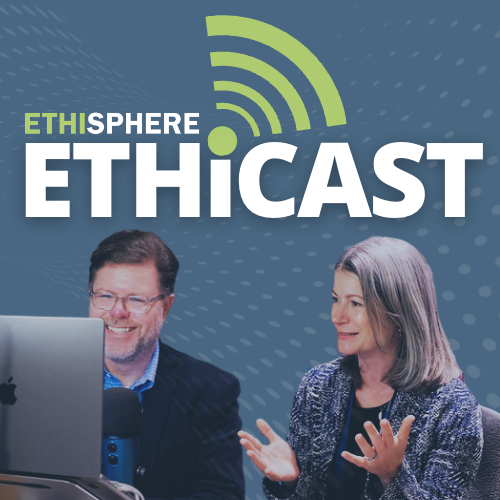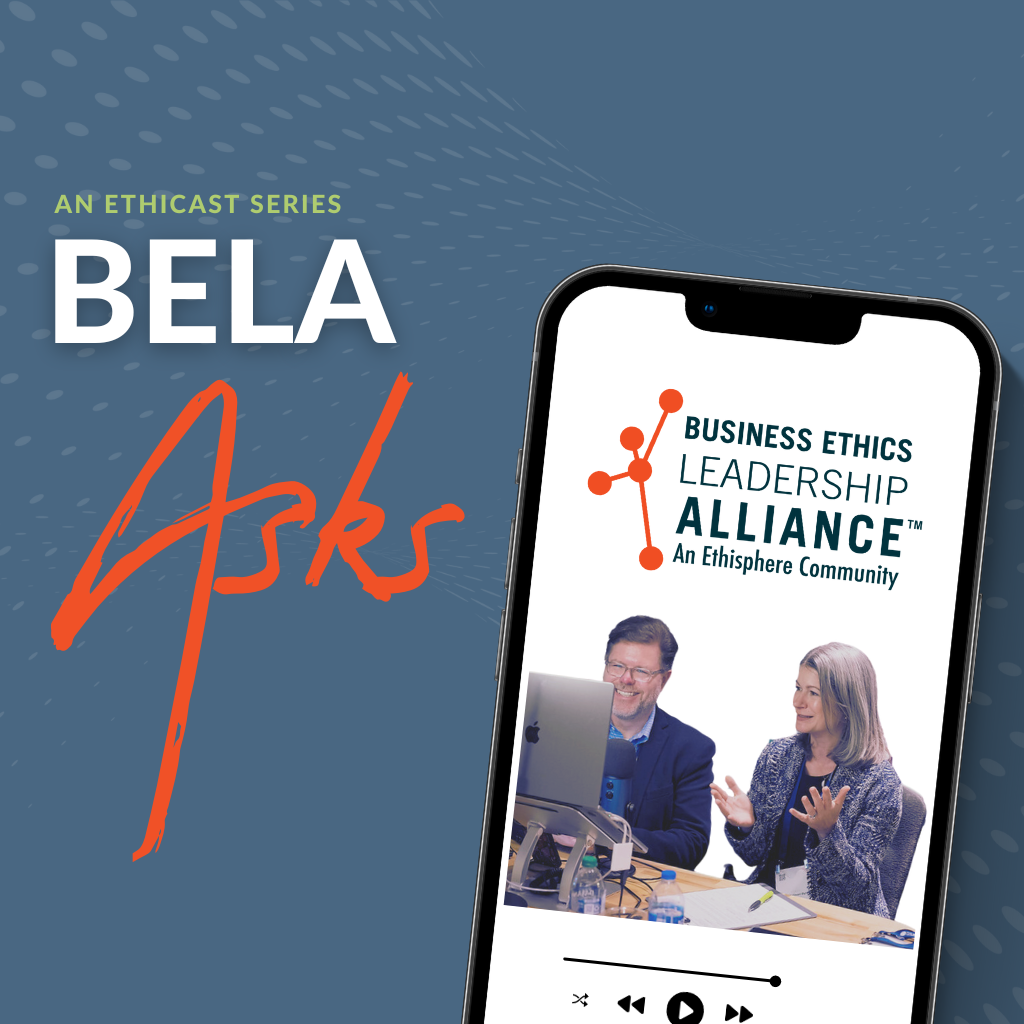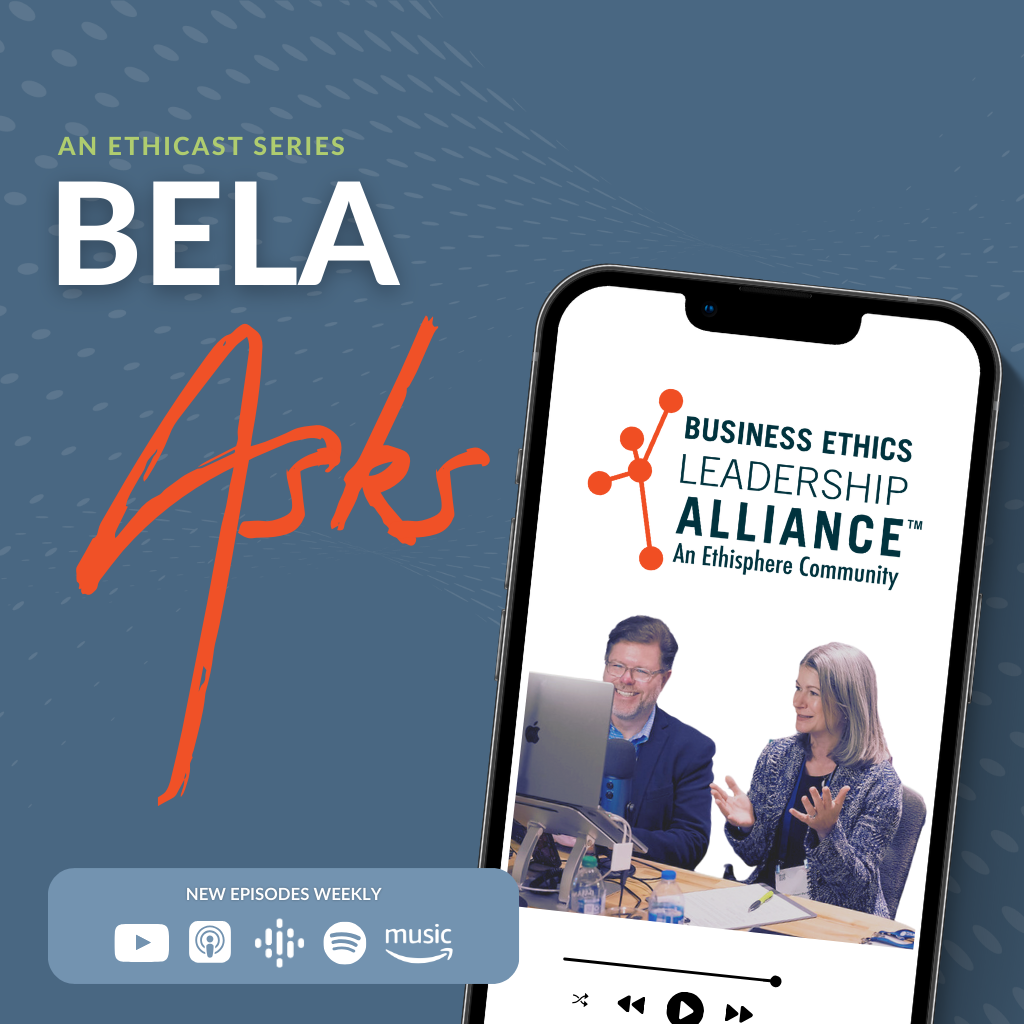Episode Transcript
[00:00:00] Speaker A: Foreign.
[00:00:15] Speaker B: You've got questions and we've got answers. Welcome to another Bella Asks episode of the Ethicast. Joining us once again to answer questions from the Bella community, it's Bella chair Erica Salmon Byrne. Erica, as always, it is a delight to see you once again.
[00:00:28] Speaker A: Oh, Bill, thank you so much. And to our Bella community that just keeps bringing us really terrific questions. Thank you guys for, for being a part of this.
[00:00:36] Speaker B: Absolutely. And we have a great question for you today, but before we get into it, just a little bit of ground of housekeeping for those who are unfamiliar with this format. The Business Ethics Leadership alliance, or bella, is a global ethics and compliance community that provides exclusive access to helpful data, benchmarking events and other resources to advance your ethics and compliance program.
One of those resources is Bella's concierge service, in which members can submit any question at all regarding ethics and compliance. And our internal experts will provide an answer, plus helpful resources with more information.
Now, while we invite everyone watching and listening to join bella. And you really, really should. It's fantastic, fantastic organization. We also know that there is no competition in compliance, so that's why we're using this program to thematically respond to high level questions from the Bella community for the benefit of ENC teams everywhere. Erica, have I got it right?
[00:01:26] Speaker A: You have gotten it perfectly right, Bill, and you should, because I think this might be our 50th Bella asks.
[00:01:31] Speaker B: I think so. I think we're at a landmark episode. So, yes, I'm quite excited. And the question we have is a great one and it's about a topic we've been covering an awful lot lately because it's quite important. It's about Speak up culture. And the question we have for you today is this, how do I keep reductions in force or riffs from hurting our Speak up culture?
[00:01:52] Speaker A: Yeah.
And Bill, this, this is both a timely topic and an evergreen topic. And it ironically is a great.
What's the word I'm looking for here? Offshoot or corollary to the Ethicast that you just ran with my colleagues Jodi Fredrickson and Eric Jorgensen on Wednesday about non retaliation and its impact on your Speak up culture. Because this is really two sides of one coin.
And I wanted to do this specific Bella Asks question, which Bill, I got yesterday for our Bella asks today because I know that so many folks out there in the community, the broader ethics and compliance community and the broader business community are dealing with rifts right now. Right. We have seen reductions in force. We have seen companies talk about eliminating roles we have seen all of these news stories and I think the thing that, that you and I need to talk a little bit about today is what is the impact of those business decisions on a speak up culture inside an organization?
Because here's what the data tells us.
On average, employees are 22 less, 22% less likely to raise their hand when there is a major transition happening in the business.
And that could be M and A activity, that could be a divestiture, that could be a riff.
So the react. And you and I, Bill, had a funny sidebar on yesterday on why we have so much war terminology in business. So I'm acknowledging that before I use this phrase. But an employee is not going to poke their head above the parapet in that kind of circumstance. That's just the reality of what we have to deal with. And so as an ethics and compliance professional, how do we do our best to maintain a culture where employees understand that it is important for us to know what is happening within the business? The, the employees are our, to use another war phrase, our first line of defense. Right.
And so how do we reinforce that first line of defense at a period in time where it can feel exceptionally and especially scary to raise your hand? And what the data tells us is it doesn't happen. It doesn't. And that's, that's the reality we have to deal with.
So this particular Bella member I was talking to yesterday said, you know, we're trying to wrap our, our, our brains around the reduction in, in calls to the speak up line that we have seen after the reduction in force. And I was like, well, I can tell you exactly how to wrap your brain around that. That's what happens, right? If you announce the reduction in force, you announce the plans to reduce headcount, you announce the fact that you're not going to replace people who are leaving and employees get scared and they try to hold onto their jobs. And so you have to double down on your messaging around the importance of raising concerns. You have to double down on your communications around stories that help people understand what you do with the information that they bring to you.
You have to make sure that you are involved in looking at Rift lists so that someone who has raised their hand is not on one of those lists. Right? That is a often, you know, kind of telltale sign of, of employees feeling like, well, see this, I know this person complained about their manager and now they're on the rift list. And so those indicia of retaliation, you have to be extra laser focused on that. You have to Be laser focused on your communications. And more than anything else, you have to understand the shift in mindset that your employees have at this moment in time. They are going to be even more scared about saying anything. And so you have to be even more diligent about your communications that it's okay to speak up.
[00:05:39] Speaker B: Yeah. Yeah. I just have to say I was so thrilled to see this question come in and I so applaud that the question was even asked because, you know, look, I'm going to be coarse here for a moment, but Riffs suck, right?
I mean, they're just terrible. Like, I, I have, I have been on either side of Rifts over the course of my career and nobody, nobody wants to do these things. They are bad for every, I mean, they're just, they're a bad experience for everybody. Nobody comes out of a Rift feeling good about anything.
And so I really, really applaud this question's reflection of a dedication to, to the Speak up culture and to psychological safety as well. And, and to the, the intrinsic role that ethics compliance has in, in fostering a culture where those things are robust, even though there are business dynamics sometimes that can be really, really tough to deal with. And so I just, I really applaud this question in a huge way.
Erica, I'm going to hit you with a question I've hit you with many times in the past, and I know the answer, but I'm going to ask it anyway. Do you mind if I ask you a follow up question?
[00:06:40] Speaker A: Bill, I will not put what I put in slack when you asked me if this was okay. Of course.
[00:06:46] Speaker B: Well, like, so we often think of Speak up as something purely impacted by retaliation or loss of faith in the system. Right, but your insights now, Rifts show how broadly, you know, Speak up and psych psychological safety intersect. You had mentioned before about how Speak up rates go down whenever you have turmoil in an organization or transition. Right. And we're talking about Rifts a whole lot here. But when we talk about this other workplace or business phenomena such as M and A activity, can you give us a sense of like, how do these things stack up? Like, like are, are Riffs the biggest suppressor of Speak up activity when you have a workplace in transition or, or you know, is M and A a larger thing? Or like, can you, can you actually rank these things? Or is it just simply when you're in transition, expect Speak up to take a hit and act accordingly?
[00:07:33] Speaker A: Yeah, it, it, it's really, I, I, I wouldn't say, Bill, that one, one type of turmoil is necessarily worse than any other type of turmoil.
Turmoil is turmoil. And if you, if you put yourself in, in the shoes of the employee, when that employee is doing the calculus as to whether or not they should say something, particularly in a circumstance where they're not sure they're right.
[00:08:01] Speaker B: Right.
[00:08:02] Speaker A: Like, there are so many things that we as compliance professionals deal with where really what, what it comes down to is an employee saying to themselves, I'm not sure I'm right about this, but something feels wrong here.
And what you want is you want to get that person to a place where they are comfortable telling you about the thing that feels wrong. Because it is. I mean, the underlying principle of the work that we all do is it is infinitely easier to solve a problem when it's tiny than it is to deal with a problem when it finally comes to light. And so the more you can do as a, as a, as a person in this discipline to understand where your employees are coming from and what that fear feels like, what that calculus looks like for them, you know, the pro con calculus of, of saying something versus not saying something. And the con calculus changes when you are not sure you're going to be able to keep your job. That's the reality. Right?
[00:09:03] Speaker B: Yeah.
[00:09:04] Speaker A: And, and that could be a divestiture, that could be an acquisition, that could be a riff, that could be the general noise out there about the fact that AI is going to take all our jobs. Right. Like we are in an environment right now where employees are very understandably and very naturally concerned about what's next.
What's next feels very unknown for a lot of people.
And so if you've got what's next unknownness on this side, and on this side, you've got two kids getting ready to go to college and a mortgage to pay.
Your calculus of whether or not it's okay to say, hey, I'm not sure we're accounting for this properly. I don't know, Bill, if you've been following it, but some of the news coverage of what's coming out as part of this first brand's bankruptcy, you know, there, there was a lot of that. That's going to be one you and I are going to ethicast reacts to at some point in the not too distant future.
[00:10:02] Speaker B: Yeah.
[00:10:02] Speaker A: And so it's, you know, you've got to, it's so tempting as a, as a, an ethics and compliance professional to default to our formal systems in moments like this. Well, we've got the right policies, we've got the right processes We've got the open doors, we've done the training, so we're going to be fine.
But the psychology of employee behavior tells us that you're not right. The psychology of employee behavior tells us that you've got to find a way to talk through the fear.
And that is the charge in moments like this.
[00:10:37] Speaker B: Well, Erica, I could not agree more. And thank you so much for appearing on the show and weighing in on this particular question. This is a really great question.
The question matters, the subject matter matters, and your answer matters. So thank you so much for coming on the show and answering this for us.
[00:10:52] Speaker A: Oh, Bill. 100%, my pleasure. And for those of you out there listening who are like, yep, get it, Erica. Now what?
Please reach out. We have so many examples of companies putting together interesting, innovative, innovative communication protocols, talking a lot about psychological safety, training their managers on how to listen for employee concerns. You are not alone in this. In. In this more than anything else, there really is no competition in compliance. So don't hesitate to let us know how we can help.
[00:11:21] Speaker B: Absolutely. And to learn more about Bella, please visit ethisphere.com bella that's B E L A to request guest access to our member resource hu and to speak with a Bella engagement director. And if you have a question you would like answered on this program, contact the Bella concierge service and we'll get to work on it for you right away.
[00:11:38] Speaker A: We love nothing more or just email me.
[00:11:42] Speaker B: Yes, email. Email Erica. We're streaming live to LinkedIn, so please directly message her as well. This is why we're doing it here. So this has been another Bella Asks episode of the Ethicast. Thank you everyone out there for joining us. We hope you've enjoyed the show. If you have not already, please go ahead and like and subscribe to the ethicast. Subscribe on YouTube, Apple Podcasts and Spotify. And please make sure you're following at the sphere on LinkedIn as well. Tell your colleagues about the show. It really helps the program. That's all for now, but until next time, remember, strong ethics is good business. See you soon.
[00:12:12] Speaker A: See you soon.


